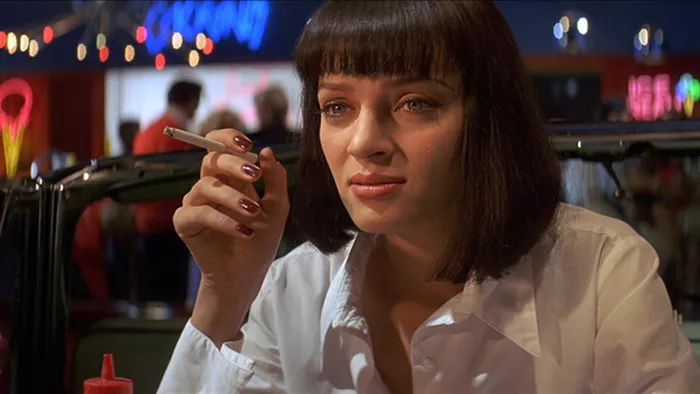Why is Pulp Fiction so famous? This question has echoed through the corridors of film history since the release of Quentin Tarantino’s iconic masterpiece in 1994. Pulp Fiction, with its non-linear narrative, unforgettable characters, and unique storytelling style, has left an indelible mark on the cinematic landscape. As we delve into the depths of its fame, we explore the various factors that contribute to its enduring popularity and the impact it has had on filmmaking.
Revolutionizing Narrative Structure
One of the primary reasons why Pulp Fiction is so famous lies in its revolutionary approach to narrative structure. Tarantino masterfully weaves multiple storylines together, creating a non-linear and complex narrative that challenges traditional storytelling norms. The film’s episodic structure, with interwoven tales of hitmen, boxers, and criminals, keeps the audience engaged and demands their active participation in connecting the dots. This departure from the conventional linear storytelling captivated audiences, making Pulp Fiction a trailblazer in narrative experimentation.
Unforgettable Characters and Dialogues
The film’s fame is also attributed to its unforgettable characters and razor-sharp dialogues. From the eccentric hitmen Vincent Vega and Jules Winnfield to the enigmatic crime boss Marsellus Wallace, each character is etched into the annals of cinematic history. The dialogue, characterized by its wit, dark humor, and cultural references, became iconic. Samuel L. Jackson’s recitation of Ezekiel 25:17 is not only etched in memory but has become a cultural phenomenon. The characters and their dialogues contribute significantly to the film’s fame and have inspired countless imitations in subsequent films.
Quentin Tarantino’s Signature Style
The answer to why Pulp Fiction is so famous also lies in Quentin Tarantino’s distinctive filmmaking style. Tarantino’s auteur status is marked by his love for genre-blending, homage to pop culture, and unconventional storytelling. Pulp Fiction epitomizes his unique approach, showcasing a blend of crime, humor, and unexpected twists. Tarantino’s meticulous attention to detail, coupled with his use of eclectic soundtracks, further elevates the film. The director’s signature style, with its amalgamation of violence, humor, and cultural references, has set a benchmark in the industry.
Soundtrack as a Narrative Element
A crucial element contributing to the film’s fame is its eclectic soundtrack. Tarantino, known for his meticulous selection of music, transforms the soundtrack into a narrative element. The eclectic mix of surf rock, soul, and rock and roll complements the film’s various moods and scenes. Whether it’s the adrenaline-pumping guitar riff of Dick Dale’s “Misirlou” during the opening credits or the soulful crooning of Al Green’s “Let’s Stay Together” in a tense moment, the soundtrack enhances the cinematic experience. This innovative use of music as a storytelling tool further distinguishes Pulp Fiction and adds to its widespread acclaim.
See Also: Why is “Interstellar” a Masterpiece?
Impact on Independent Filmmaking
The fame of Pulp Fiction extends beyond its critical and commercial success; it significantly impacted independent filmmaking. The film’s success demonstrated that unconventional storytelling and unique characters could resonate with audiences, challenging the dominance of mainstream Hollywood formulas. Independent filmmakers found inspiration in Tarantino’s success, empowering them to experiment with narrative structures and storytelling techniques. Pulp Fiction, in many ways, opened doors for independent voices, ushering in a new era of creativity and diversity in filmmaking.
Cultural Zeitgeist of the 90s
To understand why Pulp Fiction is so famous, it’s crucial to place it in the context of the cultural zeitgeist of the 90s. The film’s release coincided with a period marked by a shift in societal norms and a growing fascination with the unconventional. Pulp Fiction, with its irreverent take on crime and morality, resonated with a generation seeking narratives that reflected the complexity and ambiguity of life. The film’s impact on popular culture is evident in its influence on fashion, music, and even language, with catchphrases and references permeating everyday conversations.
Oscar Glory and Critical Acclaim
The film’s fame is further solidified by its remarkable success during the awards season. Pulp Fiction not only won the prestigious Palme d’Or at the Cannes Film Festival but also garnered multiple Academy Award nominations. The film’s screenplay, written by Tarantino and Roger Avary, won the Oscar, while John Travolta, Uma Thurman, and Samuel L. Jackson delivered performances that earned them nominations. The critical acclaim and Oscar recognition propelled Pulp Fiction into cinematic history, ensuring its place among the greatest films of all time.
Enduring Influence on Filmmaking
The enduring fame of Pulp Fiction is evident in its lasting influence on filmmaking. Filmmakers across generations continue to draw inspiration from its bold narrative choices, memorable characters, and unconventional style. The film’s impact is seen in the works of directors who cite Tarantino as an influence, creating a ripple effect that transcends time. Pulp Fiction’s legacy is not confined to the 90s; it continues to shape the cinematic landscape, proving that its fame is not a fleeting moment but a lasting testament to its cinematic brilliance.
Legacy in Popular Culture
Pulp Fiction’s fame extends beyond the confines of the silver screen, permeating popular culture in various forms. References to the film are ubiquitous in television, literature, and even other films. The iconic dance scene between Vincent Vega and Mia Wallace has been parodied and referenced countless times, becoming a cultural touchstone. The film’s enduring legacy in popular culture cements its status as a cultural phenomenon that transcends the boundaries of traditional cinema.
Conclusion
In conclusion, the question of why Pulp Fiction is so famous can be answered through a multi-faceted exploration of its groundbreaking narrative structure, unforgettable characters, Tarantino’s distinctive filmmaking style, and its impact on both independent filmmaking and popular culture. Pulp Fiction stands as a testament to the power of cinematic innovation and storytelling, earning its place as a timeless masterpiece that continues to captivate audiences and inspire filmmakers worldwide.
























